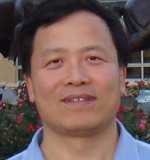 Dekai Zhang
Dekai Zhang
Associate Professor
Center for Infectious and Inflammatory Diseases
2121 W. Holcombe Blvd.
Houston, TX 77030
Phone: 713-677-7565
dzhang@ibt.tamhsc.edu
Education and Training
Dekai Zhang earned his M.S. and M.D. in Internal Medicine at Harbin Medical University and his Ph.D. in Cancer and Cell Biology at the University of Hong Kong. At Yale University School of Medicine, the Howard Hughes Medical Institute, he undertook postdoctoral studies for Cancer Research and Immunobiology. Before he joined the IBT in September 2005, he was a research associate scientist in the Department of Immunobiology at Yale University. Currently he is an associate professor in the Center for Infectious and Inflammatory Diseases at the Institute of Biosciences & Technology, Texas A&M University System Health Science Center.
Research Interests
Our laboratory is studying the molecular mechanisms of innate immune recognition by identification and analysis of receptors involved in innate immune recognition and activated signaling pathways. We are particularly interested in the recently identified family of Toll-like receptors, which play a critical role in the mounting of innate immune responses. We wish to understand the mechanisms by which TLRs recognize different pathogen associate molecular patterns (PAMPs), as well as the regulatory mechanisms of TLR signal pathways that lead to NF- k B activation. We are also interested in studying the important links between chronic infection, inflammation and cancer by utilizing biochemical as well as whole animal approaches.
Recent Publications
Five Most Significant Publications
Zhang D., Zhang GL, Hayden MS, Greenblatt M, Bussey C., Flavell R., and Ghosh S. A novel Toll-like receptor that prevents infection by uropathogenic bacteria. Science. 2004 Mar 5; 303(5663):1522-6.
(ISI Highly Cited) www.esi-topics.com/nhp/2005/may-05-Ghosh_Hayden_Zhang.html
Yarovinsky F., Zhang D., Andersen J., Bannenberg GL., Serhan C., Hieny S., Flavell RA., Ghosh S., Sher A. TLR11 activation of dendritic cells by a protozoan profilin-like protein. Science 2005 Jun 10; 308(5728):1626-9.
Rao P, Hayden M, Long M, Scott M, West P, Zhang D, Lynch C, Hoffman A, Baltimore D, Oeckinghaus A, Ghosh S. IκBβ acts to both inhibit and activate gene expression at different stages of the inflammatory response. Nature 2010 Aug 26; 466(7310):1115-9. PMID: 20740013
Shi Z, Cai Z, Sanchez A, Zhang T, Wen S, Wang J, Yang J, Fu S, Zhang D.* A novel toll-like receptor that recognizes vesicular stomatitis virus. J Biol Chem. 2011 Feb 11; 286(6):4517-24. PMID: 21131352
Cai Z, Sanchez A, Shi Z, Zhang T, Zhang D.* Activation of Toll-Like Receptor 5 on Breast Cancer Cells by Flagellin Suppresses Cell Proliferation and Tumor Growth. Cancer Res. 2011 Apr 1; 71(7):2466-75. PMID: 21427357
Additional Publications (out of more than 40 peer-reviewed papers)
Gorjestani S., Yu M., Tang B., Zhang, D., Wang D, Lin X. Phospholipase C-gamma 2 (PLCg2) is a key component in Dectin-2 signaling pathway, mediating anti-fungal innate immune responses. J Biol Chem. 2011 accepted.
Sengupta, D., Koblansky, A., Gaines J., Brown T., West PA, Zhang D., Nishikawa T., Park., Roop MR., Ghosh S. Subversion of innate immune responses by Brucella through the targeted degradation of the TLR signaling adapter, MAL. J Immunol 2010 Jan 15;184(2):956-64. PMID: 20018612
Cai Z, Shi Z, Sanchez A, Zhang T, Liu M, Yang J, Wang F, Zhang D.* Transcriptional regulation of TLR11 gene expression in epithelial cells. J Biol Chem. 2009 Nov 27; 284(48): 33088-96. [Epub ahead of print]. PMID: 19801549
Shi Z, Cai Z, Wen S, Chen C, Gendron C, Sanchez A, Patterson K, Fu S, Yang J, Wildman DE, Finnell RH, Zhang D* Transcription regulation of the novel Toll-like receptor TLR13. J Biol Chem. 2009 Jul 31; 284(31): 20540-7. PMID: 19487701
Fan Y, Mao R, Zhao Y, Yu Y, Sun W, Song P, Shi Z, Zhang D, Yvon E, Zhang H, Fu S, Yang J. Tumor necrosis factor-[alpha] induces RelA degradation via ubiquitination at LYS-195 to prevent excessive nuclear factor-[kappa]B activation. J Biol Chem. 2009 Oct 23; 284(43): 29270-7. PMID: 19706600
Sun W, Yu Y, Dotti G, Shen T, Tan X, Savoldo B, Pass AK, Chu M, Zhang D, Lu X, Fu S, Lin X, Yang J. PPM1A and PPM1B Act as IKKbeta Phosphatases to terminate TNFalpha-induced NF-kappaB activation. Cell Signal. 2009 Jan;21(1):95-102. Epub 2008 Oct 1.
Yu Y, Ge N, Xie M, Sun W, Burlingame S, Pass AK, Nuchtern JG, Zhang D, Fu S, Schneider MD, Fan J, and Yang Y, Phosphorylation of Thr-178 and Thr-184 in TAK1 T-loop is required for interleukin (IL)-1-mediated optimal NF-kB and AP-1 activations as well as IL-6 gene expression. J Biol Chem. 2008 Sep 5; 283(36):24497-505. PMID: 18617512
Cao D., Russell R., Zhang D., Leffert J., and Pizzorno G. Uridine phosphorylase (-/-) murine embryonic stem cells clarify the key role of this enzyme in the regulation of the pyrimidine salvage pathway and in the activation of fluoropyrimidines. Cancer Res. 2002; 62(8):2313-7.
Pizzorno G, Cao D, Leffert JJ, Russell RL, Zhang D., Handschumacher RE Homeostatic control of uridine and the role of uridine phosphorylase: a biological and clinical update. Biochim Biophys Acta. 2002, 1587(2-3):133-44.
Zhang D., Cao D., Russell R., and Pizzorno G. p53-dependent Suppression of Uridine Phosphorylase Gene Expression through Direct Promoter Interaction. Cancer Res 2001 61: 6899-6905.
Russell RL, Cao D, Zhang D., Handschumacher RE, Pizzorno G. Uridine phosphorylase association with vimentin. Intracellular distribution and localization. J Biol Chem 2001; 276(16):13302-7.
Yang X, Sham JS, Ng MH, Tsao SW, Zhang D., Lowe SW, Cao L. LMP1 of Epstein-Barr virus induces proliferation of primary mouse embryonic fibroblasts and cooperatively transforms the cells with a p16-insensitive CDK4 oncogene. J Virol. 2000; 74(2):883-91.
Cao DL, Immakayalu MA, Wang FY, Zhang D., Handschumacher RE, Bray-Ward P, Pizzorno G., Genomic structure, chromosomal mapping, and promoter region analysis of murine uridine phosphorylase gene. Cancer Res. 1999, 59:4997-5001.
Zhang D., Ngan H.Y.S., Cheng R.Y.S., Cheung A.N.Y., Liu S.S., and Tsao S.W., Clinical significance of telomerase activity and telomeric restriction fragment (TRF) in cervical cancer. Eur J Cancer. 1999; 35(1):154-60.
 中文版
中文版

 中文版
中文版
